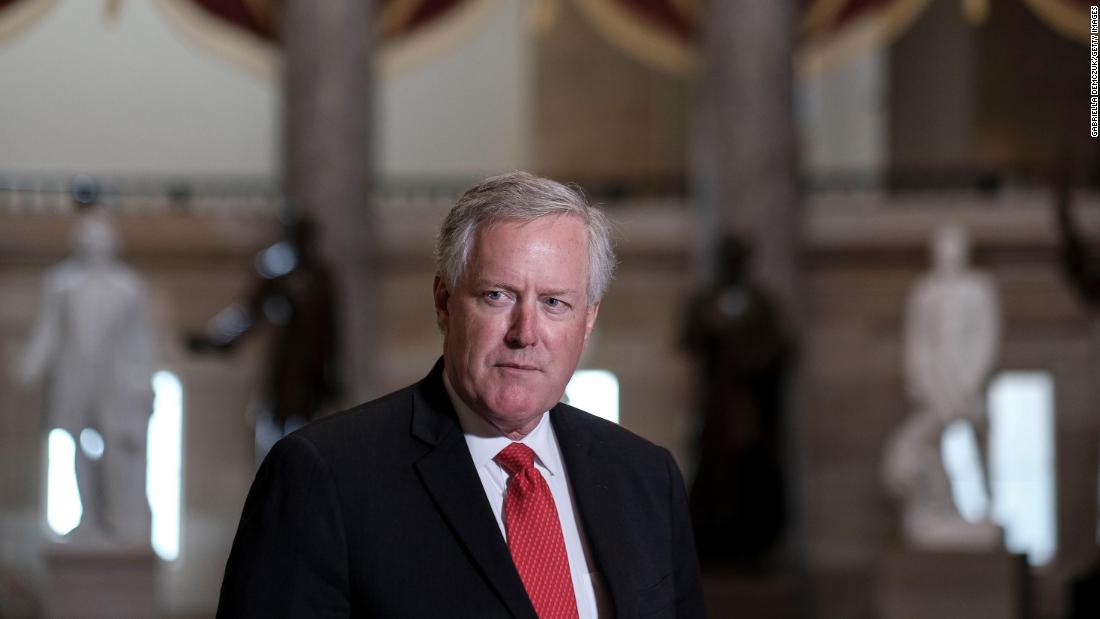January 6 committee says it is moving forward with criminal contempt for Mark Meadows
“The Select Committee is left with no choice but to advance contempt proceedings and recommend that the body in which Mr. Meadows once served refer him for criminal prosecution,” committee Chairman Bennie Thompson, a Mississippi Democrat wrote in a letter dated December 7.
The letter also reveals new details about the previous correspondence between the two parties, and shares for the first time in greater detail what information Meadows had voluntarily turned over to the committee.
Prior to Meadows’ decision to halt cooperation with the committee, he had turned over approximately 6,000 pages worth of documents to the panel. Among those pages, Thompson reveals that Meadows supplied the committee with significant information from both his personal email account and personal cell phone that are relevant to the committee’s investigation.
In one November 6, 2020, text exchange with a member of Congress, Meadows reportedly said “I love it” in a discussion about the possibility of appointing alternate electors in certain states, and the member acknowledged the plan would be “highly controversial.”
Thompson shares that the tranche of documents Meadows turned over included a January 5, 2021, email that had a 38-page PowerPoint briefing titled “Election Fraud, Foreign Interference & Options for 6 JAN” to be provided “on the hill;” a November 7, 2020, email discussing the appointment of alternate slates of electors as part of a “direct and collateral attack” after the election; and a January 5, 2021, email about having the National Guard on standby.
The committee also has in its possession a text exchange between Meadows and an organizer of the January 6 rally from early January 2021, and text messages about the need for Trump to issue some kind of a public statement to stop the January 6 attack at the Capitol.
With the emails and text messages from personal accounts provided to the committee, Thompson said Meadows also included a privilege log indicating he withheld several hundred additional emails and more than 1,000 text messages “based on claims of executive, attorney-client, or other privilege.”
“All of those documents raise issues about which the Select Committee would like to question Mr. Meadows and about which you appear to agree are not subject to a claim of privilege,” Thompson wrote in the letter informing Meadows that the committee would pursue criminal contempt proceedings against him.
Thompson also raises the question that since so many of the emails and text messages Meadows provided came from his personal accounts whether “these materials have been transferred to the National Archives in compliance with the Presidential Records Act.”
At the heart of the fallout between Meadows and the committee is a disagreement over what is covered by executive privilege.
“We now have every indication from the information supplied to us last Friday — upon which Mr. Meadows could expect to be questioned — that the Select Committee has no intention of respecting boundaries concerning Executive Privilege,” Meadows’ attorney George J. Terwilliger III stated in a letter to the committee indicating that Meadows would no longer cooperate.
In his letter replying to Meadows and his attorney, Thompson does not see it that way.
“Indeed, the Select Committee has tried repeatedly to identify with specificity the areas of inquiry that Mr. Meadows believes are protected b y a claim of executive privilege, but neither you nor Mr. Meadows has meaningfully provided that information,” Thompson wrote.
Thompson responded to this complaint by saying, “contrary to your assertion, that information does not implicate privilege, but rather concerns the date, time and dialing information about calls and messages sent or received by the specific phone numbers indicated on the subpoena.”
Lastly, Thompson pushed back on a claim by Meadows’ attorney that previous comments made by the chairman suggest “that a witness’s assertion of 5th Amendment rights is ‘tantamount to an admission of guilt.'”
“That is not an accurate characterization of my position on the 5th Amendment, nor is that interpretation of my comments consistent with our discussions about the purpose of tomorrow’s deposition — i.e., a proceeding in which your client can assert privilege claims with sufficient particularity for further consideration,” Thompson wrote on Wednesday.
While Meadows has not indicated he will claim 5th Amendment protections, multiple witnesses subpoenaed by the committee, including Trump ally Roger Stone and former DOJ official Jeffrey Clark, have said they intend to do so.
Meadows was first subpoenaed by the committee on September 23. On November 12, Meadows failed to appear for a deposition, but on November 22, the committee gave Meadows another opportunity to begin cooperating with the committee by turning over documents and scheduling a new deposition, to which Meadows agreed. But, the day before the scheduled deposition, Meadows, via his lawyer, informed the committee he would not be appearing for the scheduled December 8 deposition and would cease cooperating with the committee.
This story has been updated with additional developments Wednesday.
![]()


